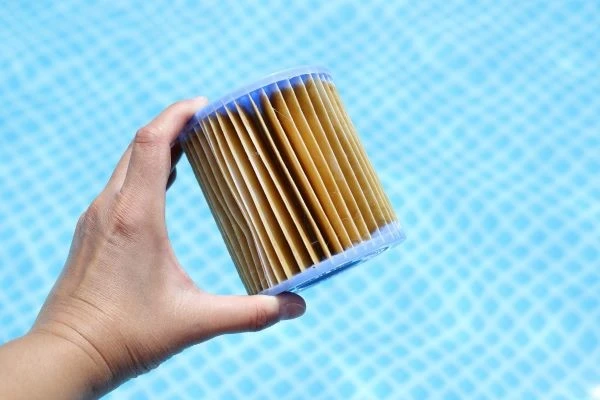As the days become longer and warmer, many homeowners start dreaming of pool parties and lazy afternoons poolside. Crystal clear waters. A happy family playing and having fun. And hours spent with pool filter maintenance tasks.
What? You’re not dreaming of pool filter maintenance?
The truth is, if you’re dreaming of clear waters, a clean, functional pool filter is mandatory for its success. Read on for our best pro tips for keeping your pool filter in tip-top shape so you can enjoy your pool all summer long.
A Clean Pool Filter Means a Clean Pool
When a filter is new, water easily passes through it. Fresh out of the box, it stops debris, impurities, and unwanted particles from entering the pool and turning it into a murky mess.
As time marches on, however, the dirt, grime, body oils, and contaminants collected build up and slowly impact the filter’s efficiency and hinder its ability to filter the water effectively. As its filtering capabilities decrease, your pool’s water quality starts to suffer, leading to cloudy water and possible harmful conditions.
Neglecting filter maintenance can also lead to premature wear and tear on the pool equipment, including the pump. A clean and adequately maintained pool filter can facilitate efficient water filtration. But when the filter is clogged or dirty, water flow is restricted, causing the pool pump to work harder to circulate the water. This puts unnecessary strain on the pump and may lead to increased energy consumption.
The average life of a pool filter is around two years. No matter how careful you are with maintenance or how much time you spend cleaning your pool, the filter eventually wears down. The oils from suntan lotion and the chemicals from hair products and skin lotions can leave chemicals behind that reduce their life span as well. Dirt and debris from the environment can swirl in, attach to the oils and chemicals, and quickly build up in your pool. It all ultimately finds its way into the filter.
This is why maintenance matters.
Choosing the Right Pool Filter for Your Needs
There are three basic types of pool filters, each with their own maintenance routines.
1. Diatomaceous Earth Pool Filter
For many homeowners, a diatomaceous earth filter (DE filter) is the most effective filtering agent used in a home pool. It’s made from pulverizing fossilized remains of diatoms, or naturally occurring sedimentary rock that is processed into a powdered form. DE filters offer the highest level of filtration and can remove particles as small as two to five microns, including algae and microscopic organisms. They provide crystal-clear water and excellent water circulation.
DE filters require more maintenance, including periodic backwashing and manual recharging with DE powder. They are most often found in in-ground pools, though you can find models for above-ground pools. You’ll typically find these in larger home pools and commercial-grade pools.
2. Sand Filters
Sand filters are the most common type. They contain a tank filled with specially graded sand that traps particles as water flows through. Sand filters are known for their durability, reliability, and ease of maintenance. They can effectively filter large debris, dirt, and smaller particles, providing clear water.
Sand filters require occasional backwashing to remove trapped debris and regenerate the sand. They are suitable for smaller- to medium-sized pools with lower debris levels.
3. Cartridge Filters
Cartridge filters consist of pleated fabric cartridges that capture impurities as water passes through them. These filters provide excellent filtration, catching smaller particles than sand filters, including fine dirt, debris, and even some bacteria. Cartridge filters have a large surface area that allows for greater water flow, reducing the strain on your pool pump.
They require simple cleaning; just remove the filter and rinse it off. Because of their simplicity, you’ll frequently find cartridge filters in home pools where a homeowner takes a DIY approach. Cartridge filters are ideal for small- to medium-sized pools with average debris levels.
Cleaning Tips for Each of the Pool Filters
If you own a pool, regular maintenance is part of the process. Cleaning the pool filter is crucial for optimal filtration performance. Depending on your pool usage and water quality, cleaning the filter at least once every few weeks is recommended. Always follow the manufacturer’s instructions for your specific filter type.
1. DE Filters
DE filters are known for their superior level of filtration, capable of removing even the smallest particles from the water. Clean it once a month or whenever the water starts looking cloudy.
Turn off the pump and set the valve to “backwash.” Run the pump until the water running out appears clear. Switch the valve to the “rinse” position, allowing water to flush out any remaining debris.
After backwashing, turn off the pump and open the filter housing. Add the recommended amount of DE powder evenly across the grids or screens. Close the filter housing, ensuring a tight seal. Switch the valve back to “filter” and restart the pump. The DE powder will coat the filter grids or screens, ready to filter the water.
2. Sand Filters
Sand filters are one of the hardest filters to clean. You can clean it through backwashing or by adding chemicals.
Start by backwashing to remove debris. Turn the pump off and add the appropriate cleaner—you can find this by referring to your owner’s manual. Turn the pump back on to filter cleaner into the system, then turn it off and leave it overnight.
Backwash the next day to ensure the system is clean.
3. Cartridge Filters
Cartridge filters are known for their high filtration capacity and efficiency. They are also the easiest to clean.
Turn off the pump before removing the filter cartridge. Rinse off any visible debris with a garden hose. Use a recommended filter cleaner—check your owner’s manual for suggestions.
Place the cartridge in a large container and soak it for the specified time. Rinse the cartridge thoroughly to remove any cleaning solution residue, then allow it to dry completely before reassembling and reinstalling it into the filter housing.
When Cleaning Isn’t Enough
Not sure if your pool filter needs cleaning or repair? Not a DIY kind of person? That’s okay. Trusting an expert like Strong Refuge Pool will ensure your pool filter maintenance is always up to date. It’s an easy way to ensure your pool looks crystal clear all season long.




